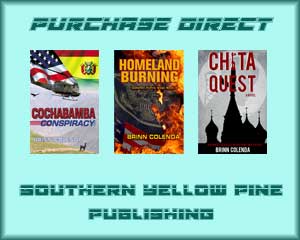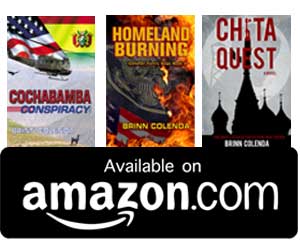The wall of thunderstorms towered out of the troposphere, reaching up sixty thousand feet and still climbing. Colonel (Brigadier General-select) Sean Callahan, USAF, had always thought the thunderstorms generated in the heat of a West Texas summer were impressive, but thunderstorms in this part of Vietnam were truly awe-inspiring…except when flying; then they were terrifying. Like all pilots, Callahan feared thunderstorms, their strength, their ferocity and their sheer unpredictability.
Leading a flight of two McDonnell-Douglas F-4D Phantom II fighters, Callahan was in no mood to dawdle. His mission was clear: help rescue a downed Air Force pilot, one of his own men shot down earlier that afternoon. Now he was surrounded by thunderstorms, climbing to the heavens like the galleries of Valhalla, the seemingly solid walls of storm cells spewing lightning in all directions. Winds slashed at the aircraft as he searched for a way through.
“Fats,” Callahan said over his intercom, “can you find us a hole through all this shit?”
“No, sir.” Callahan could hear the fear in the voice of his navigator, a chubby lieutenant from Minnesota, inevitably dubbed Minnesota Fats by the squadron. After a few combat missions the moniker had quietly changed to Mike Foxtrot, phonetic alphabet for the letters M and F, with the expected double entendre. Callahan had overheard someone call him a cowardly dirt-bag and now he knew it was true. That’s it for Fats, he thought. He’s on the next plane back to the States.
“General, are you sure this is a good idea? Maybe we should abort.”
“Fats, listen to me, you worthless son-of-a-bitch. There’s one of our guys down out there and we’re going to go find him. Is that clear enough?”
Callahan checked his wingman, flying in a loose tactical position off the left wing. He punched his mic button. “Two, got any ideas?”
The answer was immediate, as he knew it would be. “Lead, suggest heading two six zero…and lower.”
“Roger. Coming left two six zero.”
Callahan saw the rip in the wall of clouds. He gently retarded the throttles and let the nose drop slightly as he made the prescribed turn. His muscles tensed as the two F-4s descended through the broken deck of rain, clouds, and lumpy air, carefully working the canyons and valleys within the cloud system, finally breaking out over the mottled green of the Vietnamese jungle. From three thousand feet the jungle stretched out under the clouds to the horizon, with a narrow river slicing through the foliage. He could see occasional fields gouged out of the trees. To the north and west, smoke rose from burning targets, probably trucks that had been hit by the downed Phantom. The locals would be alert, armed, and angry.
Against the cloud background, Callahan picked out the OV-10A Bronco of the forward air controller (FAC) working the area and made radio contact. The FAC directed Callahan’s flight to the west, closer to the ill-defined border, while two Douglas A-1E Sandys finished their bomb runs. The broccoli tops of the jungle foliage slipped by under his nose as he eased into a gentle climb.
He expected antiaircraft fire, or small arms fire at the least. “Keep your eyes peeled, Fats.” He tapped his rudders and sent his wingman out wider. He maneuvered the formation through the mild buffeting from the rising thermals, anticipating that the FAC would send them in quickly. He glanced over his instruments one more time to ensure everything was working and checked his compass. They were heading west towards Cambodia—he thought—or at least hoped. The border in this area was as crooked as a politician—sometimes west, sometimes northeast. He didn’t know where he was except that the Cambodia and Laos borders were close, too close. And he was saddled with an incompetent, cowardly, worse-than-useless navigator.
Callahan glanced at his wingman off his right wing. Bright flashes winked from the trees as strings of tracers reached for them. “Break left!” he screamed on the radio as he dropped his wing, rammed the throttles full forward and pulled hard on the stick. Gravity sank him into his seat. His G-suit clenched at his legs and torso as he honked the Phantom around. He grunted into his oxygen mask, fighting the Gs. After about ninety degrees of turn he rolled wings level. Suddenly his canopy exploded as shells slammed into the aircraft. Both engines stopped and angry red lights lit up his panel.
“Eject! Eject! Eject!” he shouted into his mask as he pulled the ejection handle. The Martin-Baker seat exploded him into the air. The wind-blast spun him and he tumbled. His world rotated gray and green around him. The man-seat separator flung him out of the madly gyrating seat. His chute snapped open and he bounced in the harness, leg straps cutting painfully into his groin. The gyrations continued until he managed to pull on his risers and dampen the oscillations. He yanked off his oxygen mask and threw it away. As Fats’ chute drifted toward the hills, Callahan looked around.
There! More tracers off to the right. He pulled on the risers and tried to sideslip away from the bad guys. Not much time. He knew that every farmer in a three mile radius was rushing to capture him, following his descent. He looked for a good landing area. Nothing. Damn! He was going into the trees. He clenched his legs together and covered his face as he crashed through the branches. His chute caught and he slammed into a tree. He fought off his dizziness, disconnected, and dropped the last eight feet to the ground.
He tried his emergency radio. Not even static. He ran and kept on running.
As darkness fell, the rains turned into a tropical torrent. His energy was draining away with the chilly downpour. Chest heaving and nearly exhausted, he tried to get oriented. Have to keep moving. Keep moving! Using the rain and the dark of night for cover, he sloshed through rice paddies, jungle, and several small streams. He had started his trek with only a vague idea of where he was, but was certain that he was somewhere well west of where he wanted to be so he headed in what he hoped was an easterly direction towards friendly territory.
For two days and nights he stumbled through the thick jungle vegetation. The trails were steep in places, slippery from the rain, and the daytime heat was debilitating. The terrain was rugged; the declines were short and the inclines long. Exhausted and hungry, he knew he was getting careless but he had to keep moving.
Suddenly he popped out of the jungle into a clearing. Several thatched roofed hooches were in a cluster with villagers milling around. Damn! He ducked back into the trees. Not quick enough. Behind him shouts, a gunshot. He panicked and ran, stumbling through the ferns and vines.
The villagers were on him in minutes. One man tackled him, then the rest, punching and screaming. Someone shouted an order and the beating abruptly stopped. Four men held him down as another quickly stripped him of all his survival gear. They tied his hands with vines, jerked him to his feet, and pushed and shoved him through the jungle back to the village, where he was instantly surrounded by angry villagers who shouted and hit him with sticks. One old woman punched him in the stomach, a blow that sent him to his knees. That seemed to invite others who jostled and pushed for a chance to strike the hated American prisoner. An ancient man, apparently the village boss, shouted something and the crowd reluctantly moved back. A girl threw one last rock that hit Callahan in the head and nearly knocked him over. The man yelled at the girl, who backed away.
A new group emerged from the woods and joined the crowd. They were Montagnards or “mountaineers,” the indigenous tribesmen of Vietnam. Very tough. The Viet Cong had been terrorizing them for years into cooperating. Callahan’s heart sank. The leader exchanged words with the village boss; then two Montagnards hauled Callahan to his feet and shoved him towards the jungle.
Again he was pushed and dragged through the thick undergrowth. He stumbled, fell to his knees many times until they were bruised and bloody. The trail led past a grass and bamboo hooch that evolved into a well-camouflaged encampment with a few more Montagnard troops and some women. As Callahan collapsed, the women gathered around him. A few made angry gestures; more made laughing comments, no doubt about his filthy appearance. They poked with sticks, spat on him, beat him. Eventually, the crowd dispersed, leaving Callahan immobile, gasping in pain. Two men stuffed him in a bamboo cage like the ones he had seen on mink farms in Denmark. He tried to make himself comfortable, but soon discovered that was impossible. The cage was designed to prevent him from sitting up or stretching out in any direction.
At sunrise an old crone spat on Callahan and stuffed a golf ball-sized lump of dirty rice through the slats. Before he could pick it up, a detachment of North Vietnamese Army soldiers appeared out of the jungle. The NVA troops pulled him from the cage, pushed him to his feet and shoved him towards the jungle. They prodded him into a dead run. They ran and walked him into the hills for what seemed like hours. Finally they reached another well-concealed encampment even deeper in the jungle.
That night they tied Callahan to a tree. The rain beat down again, turning the camp into a mud bog, and making the cold of the jungle night even more excruciating. They kicked him awake at first light, and the group was back on the move.
They maintained a steady pace through the forest. Enormous trees maybe a hundred and fifty feet high surrounded them. Callahan despaired. Jungle cover and low rain clouds meant no search airplane could spot him through that canopy. He was unable to keep directions straight, though he knew they were certainly heading away from American and South Vietnamese positions. Every day, he was farther away from friendlies. Every day, his chances of escape sank even further.
The trail climbed through the rugged terrain, sometimes so steep that steps had been carefully and laboriously cut into the path. Day after day, the soldiers kept moving into increasingly rugged country that Callahan guessed was the Co Co Va Mountains, parallelling the Laotian border. Thirsty, dizzy, and feeble, he could barely keep up. But he willed himself to keep moving, to stay alive. He stole a drink from a creek even though he knew that ground water in these areas could be contaminated from lack of natural filtration in the porous aquifer. Some hours later, he felt ominous rumblings in his stomach and something foul running down his leg. If they didn’t stop soon, he would die.
As the sun set, they came upon a small prison encampment carved into the hillside, surrounded by the jungle, well concealed. Like a Vietnamese version of Devil’s Island or Alcatraz: even if an inmate escaped from the camp, the surrounding environment would kill him.
Ironically, the first thing the soldiers did was strip off his aviator boots. He could hardly walk, much less run away.
Confined alone in a small hut with no blanket and a bed that was just a board about a foot wide atop two bricks, Callahan was left alone except for occasional visits from the camp doctor. Between the doctor’s rudimentary French and his West Point French plus the little bit of Italian he had learned from his Tuscan-raised wife, they could communicate. The doctor forced Callahan to eat the sticky, marmalade-like pulp of a green, baseball-sized fruit that he had never seen before. A few hours later, the dysentery seemed to be cured.
He was often cold due to the surprisingly chilly rain. Downpours continued for days, making the camp a foul smelling cesspool that stank of pain, of fear. He was fed only starvation rations, occasional rice balls mixed with dirt and vermin, no meat or vegetables. Never heavy, he began to shed weight.
Through cracks in his hooch, he glimpsed eight or ten other Americans in the camp, but he was kept separate from them. He knew exactly what the guards were doing: using standard Communist brainwashing technique. Solitary confinement deprived prisoners of a community of peers so they had no one to talk to, no one to support them, no one to act as a filter for their thoughts or a check on their reasoning. When a prisoner was lead into an interrogation, it would be easier to get him to talk. About anything. And everything. Knowing that one day the interrogator would arrive with his list of questions did not make it much easier to survive in a filthy room infested with bugs and the occasional rat.
His daily task was simple: survive this day, then survive the next. One day at a time. The war would be over for the U.S. military pretty soon, perhaps by spring. All he had to do was survive. That was his job now, to stay alive. He was the fourth generation of Callahans to serve the military of the United States. He was valued. His government would do everything it could to get him back to his wife and kids. This one thought, this central ideal Callahan knew in his soul. His job was to keep the faith and survive for however long it took. His country would rescue him.
Weeks passed—how many he wasn’t quite sure. He exercised his body with short workouts of isometrics, alternating with pushups, sit-ups, and pacing the small hooch for aerobic conditioning. He occupied his mind, imagining an art gallery opposite the plaza in Taos, New Mexico, the dream of his artist wife. He had already mentally surveyed the existing historic property, conducted negotiations with the owners, and completed renovations. He was visualizing the arrangement of artwork when two guards burst into his room, dragged him across the camp, and dumped him on the floor of the largest hooch.
The room was empty except for a rough desk, chair, and a stool. Ah, the infamous interrogation room. He steeled himself for the encounter. The rear door opened and in walked a tall man dressed in unmarked fatigues. Callahan’s first impression was how clean and well fed he looked. With a start, he realized the man was Caucasian, not Oriental.
The man sat at the desk and motioned for him to sit on the low stool. Each surveyed the other like boxers before a match. The man took a packet of cigarettes from his shirt pocket and offered one to Callahan who shook his head.
“General Callahan, I am Lieutenant Colonel Alexy Petrovich, Soviet Air Force. I have come a very long way to meet you.”
Petrovich spoke in Russian. Callahan remained silent.
“Come, General, I know that you speak some Russian. It would be best for both of us if you cooperated with me.”
Callahan answered in English with his name, rank, and serial number.
Petrovich smiled. “Excellent. So you haven’t lost the ability to speak. I was afraid that the—how to say—the lack of hospitality shown to you by our socialist comrades would have injured you in some way.”
Callahan repeated his name, rank, and serial number, again in English.
Petrovich smiled again. “Thank you, General, but I already knew all that.” He opened the dossier on the desk and handed Callahan an official USAF document. “It seems this announcement was a bit premature.”
Callahan looked down at the document. His own face stared back out of the official photograph, a face he could scarcely remember: clean, hair neatly cut, in Class A uniform adorned with his wings and medals. Most impressive. It was the official announcement of his selection to brigadier general and included his biography, the name of his wife and number of children, a list of his past assignments and honors. It seemed so unreal.
Petrovich said, “Perhaps you would like to look through this.” He handed Callahan the dossier. The folder contained dozens of clippings, covering Callahan’s career, his completion certificate from Test Pilot School, even his West Point graduation announcement. More chilling, it had information about his family—a surprisingly detailed genealogy of his White Russian émigré, Chinese-born wife, and worse, photos of his kids.
“So, you can see that we know quite a bit about Brigadier General Sean Thomas Callahan, United States Air Force. Perhaps now we can dispense with the stubbornness.”
Callahan, still in shock from the photos, said nothing.
“General, I am sorry that you refuse to speak to me. I regret that my English is not good enough for an in-depth discussion. But I do have someone from my staff who can help. His English is excellent.” He turned to the door. “Comrade!”
Through the door walked another Caucasian, wearing unmarked fatigues and a smirk.
Callahan froze, then leapt to his feet. “Fats! You sonofabitch! You—”
The man punched Callahan in the face. The force of the blow knocked him down and blood spurted from his broken nose. He hit the wall so hard that he lost consciousness.
When he opened his eyes again, the man stood over him. “Nobody will ever call me Fats again. Thank you, General, for providing me the opportunity to do that.”
The Russian officer motioned to Callahan to sit. He struggled to his knees, took a deep breath, and lurched onto the stool.
“Now, General, shall we begin again?”
Between 12 February and 4 April, 1973, 591 American POWs were freed and returned home to the United States to parades and the arms of their families. The name Sean Thomas Callahan was absent from all lists provided by the government of North Vietnam. No explanation was ever provided. No responses were ever received from the governments of Cambodia or Laos. His status continues to be listed as MIA.
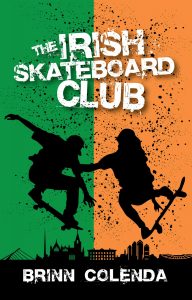 Here is my newest.
Here is my newest.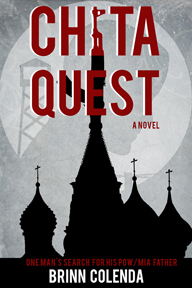


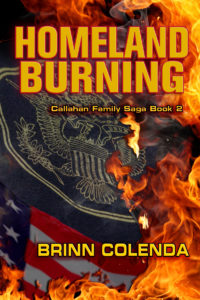 In the Southwest, we don’t have natural disasters like hurricanes, tornadoes, or earthquakes. We have our own—drought (or flash floods) and heat. Lots of heat! Which leads to the biggie—wildfires. Today’s fires are generally bigger and hotter than ever before and threaten lives as well as western watersheds and water systems.
In the Southwest, we don’t have natural disasters like hurricanes, tornadoes, or earthquakes. We have our own—drought (or flash floods) and heat. Lots of heat! Which leads to the biggie—wildfires. Today’s fires are generally bigger and hotter than ever before and threaten lives as well as western watersheds and water systems.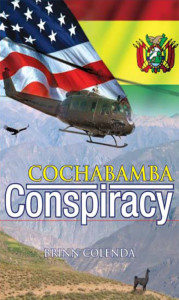 I spent two years working in the U.S. Embassy in La Paz, Bolivia, followed by a post-graduate Fellowship at Stanford. The other Fellows knew very little about the Andean countries and were intrigued by things that happened to us in Bolivia. So, I decided that my first thriller would be set in that country.
I spent two years working in the U.S. Embassy in La Paz, Bolivia, followed by a post-graduate Fellowship at Stanford. The other Fellows knew very little about the Andean countries and were intrigued by things that happened to us in Bolivia. So, I decided that my first thriller would be set in that country.

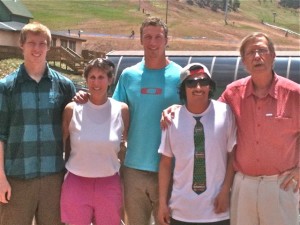 After my career in the Air Force, we moved to New Mexico to raise Da Boyz. Massive adventure! Spent a lot of time on the slopes, first teaching the boys to ski, then watching in amazement as they started blowing me off the mountains. I remember one National Championship at Northstar-at-Tahoe, skiing the blacks as fast as I could go and seeing the boys ski/snowboard through the black glades, dodging trees and accelerating away from me!
After my career in the Air Force, we moved to New Mexico to raise Da Boyz. Massive adventure! Spent a lot of time on the slopes, first teaching the boys to ski, then watching in amazement as they started blowing me off the mountains. I remember one National Championship at Northstar-at-Tahoe, skiing the blacks as fast as I could go and seeing the boys ski/snowboard through the black glades, dodging trees and accelerating away from me!